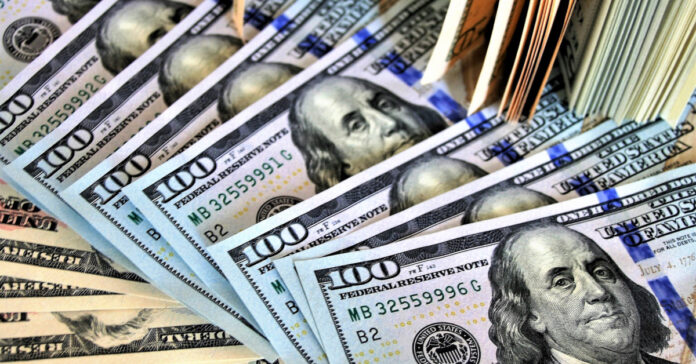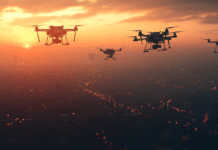
My wife and I each have two credit cards. We pay them off each month and never carry a balance. Between the two of us and my small side business, we have five bank accounts, one of which is a joint account, and three debit cards. Yet I try to act “un-banked” as much as I can.
This means I deal in cash as often as possible and try to cash checks rather than deposit them. We’re not unbanked, but we are trying to live like we are, to minimize our financial footprint. I recommend you try it because one day it may become even more important to avoid leaving breadcrumbs behind with every purchase you make.
Have Emergency Cash
The topic of carrying cash came up when my family was visiting. My son-in-law said, “Oh, I never carry cash.” I laughed because I am the exact opposite. At the time he said that I had $312 in my pockets and more in my money belt.
“What will you do if you need to buy gas on the way home and the internet is down so no one can accept credit cards?” I asked, explaining that credit card machines and ATMs all use the internet to process transactions. Cell phones also rely on the global networks. Internet outages happen, and wireless networks go down or get hacked. He should have enough cash to get home if things shut down.
Twice in the past four years, I’ve been able to pay cash for goods when everyone else in the store or restaurant was waiting around, hoping the credit card processing machines would start working.
“Do you at least carry some cash in your car for an emergency?” asked my wife, who does. No, they said. My daughter may have a decent amount of food in her basement, but they haven’t fully adopted the prepper lifestyle. I guess they are too busy dealing with the everyday problems life hands them than to worry about big, societal problems.
In a massive grid-down scenario, the kind of SHTF event that may last for months or even years, having cash on hand will let you buy all those last-minute things you need during the period in which people are worried but not yet panicked. Our last-minute list includes topping off the gas cans and buying chicken feed, a 50-pound bag of potatoes, a big bag of onions, cabbage, squash, crackers, peanut butter and a range of other canned or dried foods.
Getting Cash
How do you build a stash of cash? Just like you build your preps, over time.
Maybe you have heard how difficult it can be to get cash out of the bank. The tellers give you the third degree if you try to withdraw anything more than a few hundred dollars. If you need several thousand dollars in cash, you often have to go to the bank and “order” the money so the branch can have enough cash on hand to pay you. There are stories of people waiting a few days just to get access to their own money because they insisted on getting cash.
Going to the drive-through window rather than walking into the bank may reduce nosey questions, but I do three things to make sure I have cash on hand, no questions asked.
Visit the ATM
First, I use the ATM. No one questions you when you make an ATM withdrawal. The machine clicks, whirs, and counts out several hundred dollars. I know of an ATM in our area that offers $50 bills. I usually take out $400 or $500 at a time, getting at least half in $50s. Remember when no one wanted to break a $50 or a $100 bill? Thanks to inflation, that is no longer the case. Larger bills are becoming commonplace.
If you have enough money in the bank, you can go to an ATM several days a week and quickly accumulate a stack of cash. Just try to stick to machines that are in your bank’s network to avoid fees. Having to pay $3 or $4 to get $100 of your money out of your account is highway robbery.
I also suggest making an ATM withdrawal on a regular basis, even if you don’t need the cash. It establishes a track record and you can build up your cash stash. If you reach a point where you think you have too much cash on hand, then buy a gold coin and pay cash.
Cash a Check
If you ever get paid by check, go to the bank and cash it. I find banks are far more willing to cash a check than to give you cash from your own account. I think it is because there is a paper trail of sorts. If you have a check from a big business such as your insurance company, the bank has a high degree of confidence the funds are legitimate and usually won’t hesitate to count out the cash.
This works best if you go to a bank where you have an account, and it is even better if you have sufficient funds in your account to cover the amount of the check. You can also try to go to the bank on which the check was drawn, but this may be more difficult depending on that bank’s policies and the size of the check.
When I got the insurance payout after the lady totaled my truck, it was more than $6,000. I didn’t cash the whole thing. I deposited it with $500 or $800 cash back. Before I knew it, the teller was asking, “How do you want the cash back?” I always get $100 bills when I visit the bank because no ATM in our area offers them.
Don’t Deposit Cash
When I received $1,400 in cash from the pawn shop earlier this year, I didn’t rush to the bank and deposited it like I might have 15 years ago. Nope. I hung on to it. I used it to buy at least two loads of firewood and for many other purchases, but I still have cash from that sale in my gun safe right now.
It is nobody’s business how much cash you have in your possession or why. I would caution you to secure it and if you have more than a couple thousand, to distribute it or hide it in multiple places.
The only downside to having cash in your home is that it can get stolen or confiscated by law enforcement. So if you are smart enough to have cash on hand, don’t be dumb enough to do something that would cause the police to get a search warrant.
If I’d been lucky enough to get $14,000 cash at the pawn shop, I would not have hung on to it all, but neither would I have deposited it. I would have likely gone to a coin store and bought gold and silver bullion. When the dollar is devalued, precious metals will retain their value and give you some spending power. Everywhere there has been hyperinflation—from Germany’s Weimar Republic to Zimbabwe—gold has allowed people to survive an economic collapse. In at least one case I know of, people panned gold in rivers and streams just to buy food for the day. When it costs ten million to buy a loaf of bread, a few tiny flakes of gold on a gold pan can buy dinner.
Anonymity
While you could argue that the IRS has an interest in knowing how much money you make, no one has the right to know how much money you have. This is one reason I like to operate with cash. No one knows how much I have, how much I spend, or what I spend it on. When I take $500 from an ATM, the bank doesn’t know where it ends up, and neither does the government, especially if it passes through multiple hands before being deposited into another bank.
If I pay cash for a haircut and tip my barber, I do not know if he puts that money in his pocket or in his bank account, nor do I care. If I eat lunch at a mom-and-pop restaurant and leave a $20 on the table to settle my bill, it’s none of my business what the restaurant and the server do with the money, and that’s the way I like it.
Likewise, if I buy a gun or some ammo, I like to use cash. This isn’t always possible, but you should avoid using credit cards at gun stores or other places that might put you on a list. That same list might be used by the government to label you a potential domestic terrorist or by your bank as an excuse to close your account. I can see a future in which having a charge for something that is legal but considered politically incorrect show up on your debit card could affect your credit rating, how much you pay for car insurance, or even how aggressively TSA searches you at the airport. China is already down this path and the Biden Administration is hot on their heels.
Avoiding Garnishments
I worked with guys who had their child support payments taken out of their check by court order. When our employer cut their paycheck, they also cut one to the child welfare folks who then paid the mother. People also get their wages garnished if they lose a lawsuit or have to pay someone restitution for a crime. Well, the courts can’t take your cash if they don’t know you have it. Likewise, debt collectors can’t take your cash or precious metals if they aren’t in the books.
Which brings up an important point: don’t use cash when you pay your taxes, your hospital bill, or any other large entity. I buy gasoline with my credit card, and my wife often uses hers for groceries. Most of our recurring household bills are paid by my American Express card and then I make one online payment to pay Amex. Not only does this make paying our monthly bills easy, the bank doesn’t have a detailed record of our spending. Maybe I shouldn’t, but I trust American Express slightly more than I trust the banks.
I also use plastic for anything that will go on taxes, especially if it is a deductible expense. When I buy chicken feed, I put it on a credit card because I want to have a record of the expense should the IRS question my deductions. Using a check will also give you a record, if you are one of the diminishing few who still use checks.
I look at the dangers of having cash stolen and compare it to the dangers of having cash in the bank that could be garnished by the government, frozen by the bank, or subject to taxes, and cash seems safer. Not $50,000 mind you, but maybe $3,000 to $5,000.
Act like you are Unbanked
Like I said, we’re not unbanked by any stretch. We have IRAs and investments. We pay for our cell phones, internet access, streaming services and other recurring expenses electronically or via credit card. But we also pick and choose. Plenty of things get paid for in cash. Some of these are things the government like frown upon. Others are for convenience. All of them are to reinforce the message that what we do with our money is no one’s business but our own. As long as we pay taxes on our income, Uncle Sam should butt out.
Try carrying cash and spending it. It will provide one step of insulation between you and the people and businesses that electronically track your every move.






